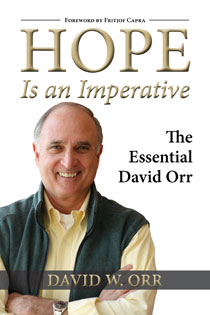"No one writes more intelligently—or more eloquently—about the major issues of our time than David Orr. His essays are at once a challenge and an inspiration."
Elizabeth Kolbert, author of "Field Notes from a Catastrophe: Man, Nature, and Climate Change"
"David Orr is a treasure trove of provocative thought as he probes the treacherous fault lines leading to unsustainable communities and ecological collapse. He challenges us to tear down the walls of separation between analytical science and intergenerational love and to ponder knowledge in search of life-sustaining wisdom."
Larry Schweiger, President, National Wildlife Federation
"Orr (environmental studies and politics, Oberlin College) has assembled 35 essays he wrote between 1985 and 2000 documenting and analyzing what he calls the white-water rapids that human civilization entered during that period. The overall themes are the fundamentals, sustainability, ecological design, education, and energy and climate. Among the topics are verbicide, walking north on a southbound train, designing minds, ecological literacy, and Pascal's wager and economics in a hotter time."
Book News
"David W. Orr is obviously a very intelligent man and his essays provide rich food for thoughts for those of us who want to steer the world in a more sustainable direction."
TreeHugger
"Orr lays out our societal blocks candidly, examines them, and then plainly and honestly states next steps. Steps that, while not necessarily easy, will help us evolve beyond current cultural constructs. This book dares you to be humble and to not react to ignorance and arrogance but rather reflect and respond with care and integrity. This book begins and ends by challenging and encouraging those who profess to lead, to teach, to do good in the world: Demonstrate your worth. Be humble, be honest, be visionary. Act. Study, love, appreciate, work with, and emulate what gives us life, purpose, connection, and beauty. There is so much more I would love to share about this book. It is totally worth your time and energy. Read it!"
Massachusetts Environmental Education Society
"When someone new to sustainability asks me how to prepare for the journey, I say read David Orr. When a longtimer asks what will open their heart and mind all over again, I send them David's latest. If you crave honest, impassioned, and impeccably researched conversation about things that really matter, buy this book as a gift to yourself. You'll find no better thinking partner."
Janine Benyus, author of "Biomimicry: Innovation Inspried by Nature"
"Like our other environmental heros, Rachel Carson and Aldo Leopold, David Orr's genius likes in his ability to bring together the practical wisdom of the ecological sciences, the moral clarity of ethics, and the power of incisive prose. Hope is an Imperative is a gift of enduring insight and imagination, a source of hope in itself."
Kathleen Dean Moore, author of "Wild Comfort"
"Hope Is an Imperative is a compilation of some of the most provocative and poignant essays of distinguished American environmental studies professor and writer David Orr...the wisdom in this anthology can provide inspiration and ideas for how to apply sustainability principles into your teaching programs, community, and life."
Green Teacher
"[Orr] provides clear analysis of issues and lays out ethical and practical actions ... I gained insight and inspiration from nearly every page of this book, as evidenced by a nearly dry highlighter ... should be mandatory yearly reading for all those in the field of education... Get the book. You won't regret it ... The clarity of the arguments and the inspiration provided in this collection will increase the measure of your life's work thereafter."
Natural Areas Journal

